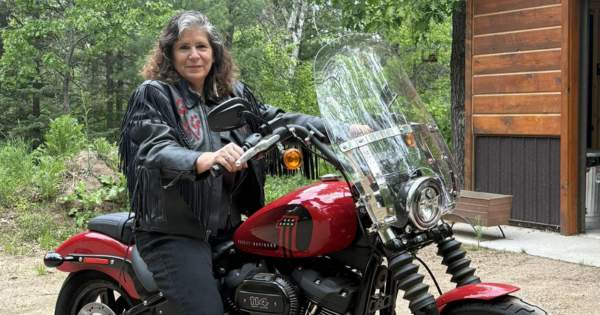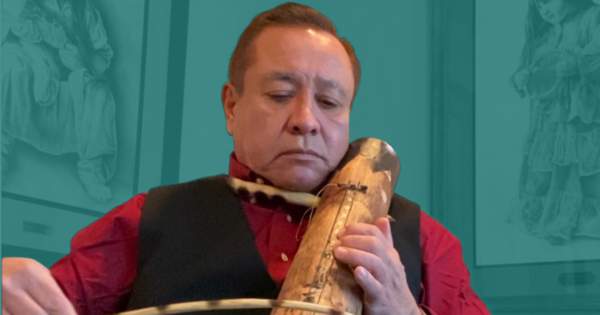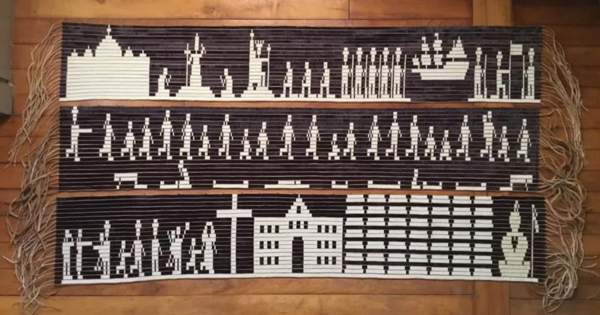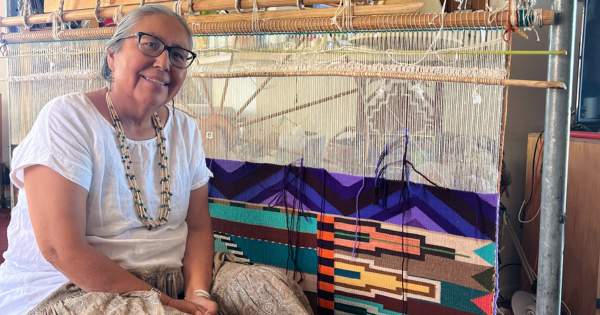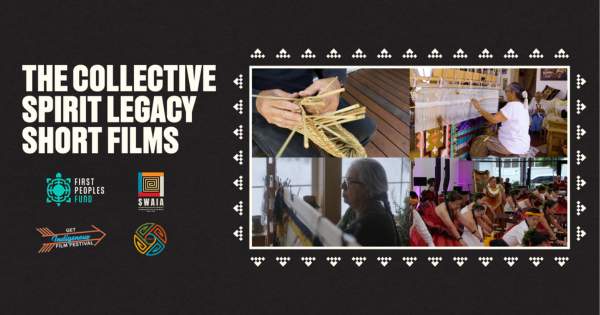
Made in Zuni
By Sarah Elisabeth Sawyer (Choctaw Nation), Artist in Business Leadership Fellow 2015
Image: Dowa Yalanne, Zuni Pueblo’s sacred Corn Mountain.
Cast in the vast desert beauty of New Mexico, Zuni Pueblo holds treasured lifeways dating back thousands of years. Handed down from their ancestors, 7,500 Zuni artists practice pottery, jewelry making, beadworking, fetish-carving, and painting.
A First Peoples Fund partner and 2019 Indigenous Arts Ecology grantee, Zuni Pueblo MainStreet, is part of the movement to support and train Native artists. Zuni Pueblo MainStreet was created in 2012 to utilize new approaches and methods, encouraging revitalization of the local economy while continuing to preserve unique traditional and historical knowledge.
The program works with 150 artists, an imbalance with the 7,500 who rarely have access to assistance. The organization’s vision is to reach out to more artists and empower them as entrepreneurs by generating opportunities for them to display and sell their work locally, and enable them to refine their current skill sets and gain knowledge and expertise on how to better market themselves.
With support from their First Peoples Fund Indigenous Arts Ecology grant, Zuni Pueblo MainStreet is helping to develop Ancestral Rich Treasures of Zuni Cooperative — “ARTZ.” This cooperative opened a gallery and gift shop space in an old trading post that stood vacant for years. Now operated for artists and by artists, ARTZ Cooperative also has a photography studio space. Zuni Pueblo MainStreet purchased the photography equipment to allow artists to take professional photos of their work.
Through First Peoples Fund’s Native Artist Professional Development Training (NAPD), Zuni Pueblo MainStreet guides artists in preparing portfolios of their work. First Peoples Fund held an NAPD training in Zuni in 2015, then worked with Zuni Main Street in 2018 with more training. The March 2019 NAPD training, taught by Felecia Freeman (Citizen Potawatomi) and Leslie Deer (Muscogee (Creek) Nation), was well attended.
“We had over 30 applicants, and 27 actually received the training,” says Mario Hooee (Zuni Tribe). Mario is the executive director of Zuni Pueblo MainStreet. He served several years on its board, often as an officer, and holds a Bachelor’s in Business Administration in Finance and Masters in Public Administration from the University of New Mexico (UNM).
First Peoples Fund is also connected with the youth program, Zuni Youth Enrichment Project, had staff in a training for poet mentors, and discussed including this organization in the Emerging Poets Fellowship.
“The artists create wonderful art, yet they’re individuals,” he says. “They have their own mindset, they’ve had small cottage businesses for a while, some for many years. When you put them together, it’s a little bit difficult to get them to focus on one thing and continue that. We have to reel them in once in a while.”
ARTZ Cooperative evolved from ArtWalk , a monthly event in Zuni that allows visitors to tour home studios and other spaces where artists create their work. ArtWalk originated in late 2017 through UNM’s Indigenous Design and Planning Institute with an ArtPlace America grant. They feature artists, like Eldrick and Charlotte Seoutewa, each month. The couple works together from their home, crafting contemporary in-lay jewelry as well as needle-point jewelry.
Zuni Pueblo MainStreet works with both the ARTZ Cooperative and ArtWalk, who are focused on the professional development of Indigenous artists. After ARTZ was incorporated, the Zuni Pueblo MainStreet’s Indigenous Arts Ecology (IAE) work plan and budget were adjusted to assist the new co-op. Since ARTZ is a registered legal entity devoted to the professional development and welfare of artists, Zuni Pueblo MainStreet is assisting them with their new start-up. Located on the Main Street corridor, the ARTZ Cooperative facility held their grand opening in August 2019.
“One of our focuses is helping community artists,” Mario says. “About 80% of our households either do artwork for their sole employment, or they subsidize their income with art. We’ve been working to help them become more professional, and have their artwork more as a business than a hobby or something they create and sell just to get by each day.”
While the arts and crafts industry is an essential asset to the Zuni community, those involved in arts production are not well woven into the economy or supported by training. An economic assessment report was produced in 2014 by the University of New Mexico Bureau of Business and Economic Reports in which various artist needs were identified. Zuni Pueblo MainStreet is working to fill gaps of those needs, such as with marketing authentic art to tourists.
Often copied by fraudulent sources, the artists and change-makers of Zuni are working to bring authentic art to visitors who come to the area. Archeology tours, cozy lodging, food, and historical and sacred sites combine to make Zuni a top cultural and historical destination. “Made in Zuni” helped catch the attention of Official Best of America Travel TV , which designated Zuni as the “Best Historical Native Destination.”
A promo video, filmed by Brett Allen from Official Best of America , was funded by the IAE grant. The video aired in Chicago, and is set to air in Indianapolis, Albuquerque, and Phoenix, and possibly in Utah and Colorado. Zuni is the first to be designated as the “Best Historical Native Destination.” Through their artists, Zuni is sharing who they are as a people.
“The Indigenous Arts Ecology grant has really helped us with assisting our artists, especially with the art co-op,” Mario says. “The IAE grant has been a timely and wonderful blessing to the arts community of Zuni. The arts community has a new resource for professional development and a place to find answers and sell their work. The creative economy is a major contributor to Zuni’s overall economy. The influence of First Peoples Fund and the IAE grant will benefit Zuni and the artist community for many years to come.”

